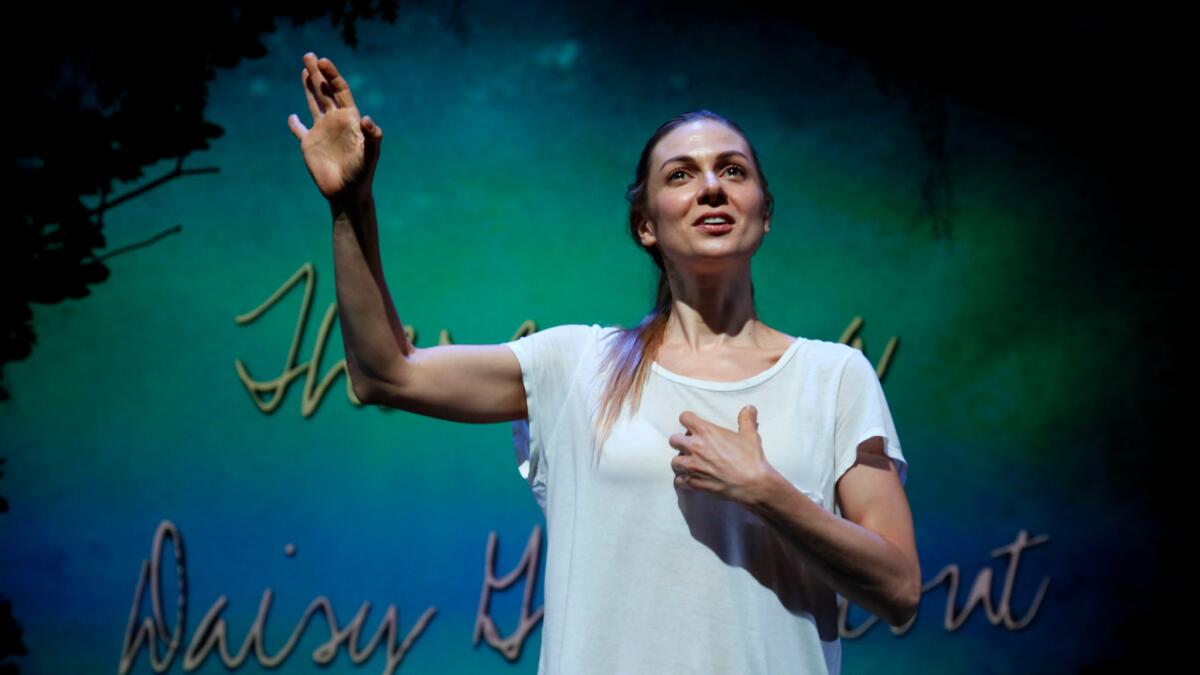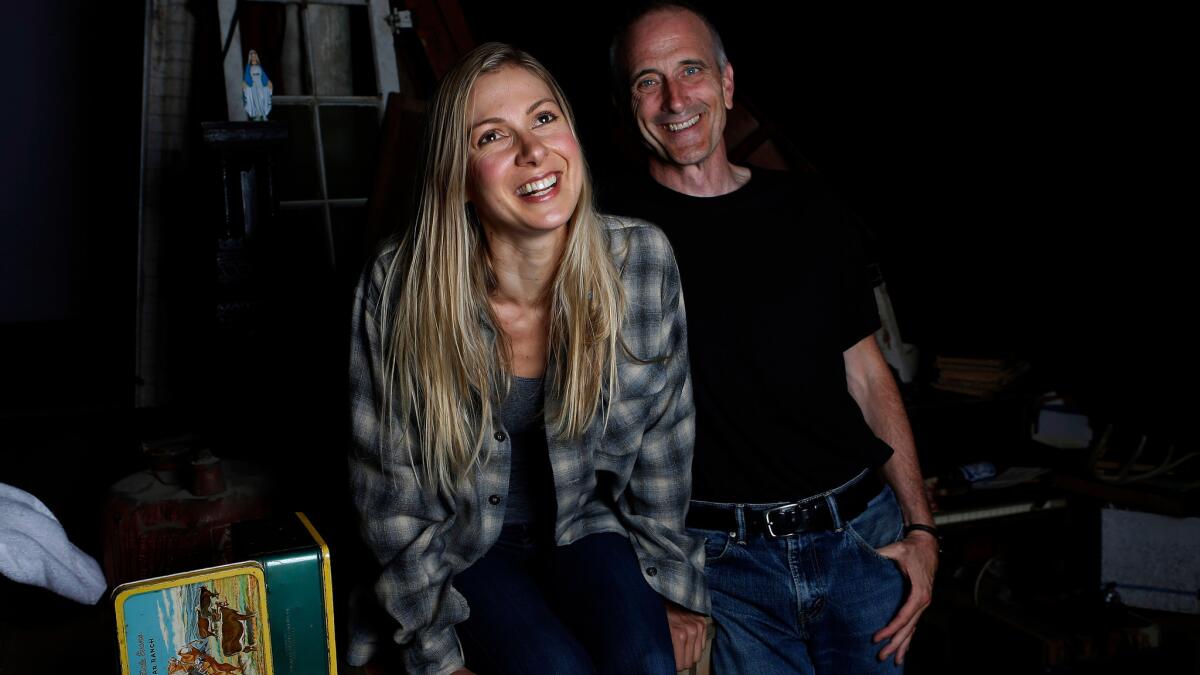From ‘Beasts of the Southern Wild’ to ‘Burnpile’ at the Kirk Douglas: Lucy Alibar finds her voice

The writer and performer Lucy Alibar, best known for co-writing the Oscar-nominated screenplay for “Beasts of the Southern Wild,” tends to socialize with an urbane and liberal crowd. She graduated from the Experimental Theatre Wing at New York University’s Tisch School of the Arts, she has developed work at the Ojai Playwrights Conference and the Sundance Theatre Lab, she’s walked the red carpet at movie premieres, and when she’s in L.A., she wakes up early for those breakfast development meetings.
But every once in a while, she’ll have a moment when she recognizes how far she’s traveled from her childhood in Grady County, Florida, deep in Pentecostal territory, on a farm overrun with cats. That’s where her father, a criminal defense attorney and committed atheist, kept a pile of junk — they called it his burnpile — that towered over the house. To Alibar, this was home, and none of its details seemed unusual except when she’d mention them to a Northerner.
At a recent theater workshop, she was talking about a Florida restaurant that would give away French fries when a death-row prisoner was electrocuted. “One of the actors was Canadian, and he just goes, ‘That’s awful!’” Alibar recalls. “And he’s this opera singer, so he has this big, booming voice. And even then I was like, ‘Oh right, it is awful.’ I mean, it’s so, so horrifying. But it was so normal for me.”
Alibar’s childhood experiences in the Florida Panhandle and her complex bond with her father inspired her new one-woman show, “Throw Me on the Burnpile and Light Me Up,” having its world premiere at Center Theatre Group’s Kirk Douglas Theatre, opening Friday and running through Oct. 2. Alibar developed the material with director Neel Keller of CTG. The two met at the Ojai Playwrights Conference in 2013, after Alibar submitted a collection of short stories that, she explained in the cover letter, might be a play. Conference artistic director Robert Egan agreed and invited Keller to work with her.
“Bob said, ‘I think you’re going to like Neel. He’s from the South,’” Alibar recalls. “Maybe that was his only criterion: ‘I just need someone to understand what she’s saying when she talks.’”
It proved a good hunch: Keller, who grew up in North Carolina, read Alibar’s draft and detected the elusive theatrical quality he likes to describe as “magic in the bottle.” They had an immediate rapport at Ojai and went on to workshop “Burnpile” at Sundance Theater Lab, New York’s Under the Radar Festival and the Douglas in 2015, as part of CTG’s DouglasPlus series for in-progress work. Then CTG artistic director Michael Ritchie offered Alibar a full production.
“My last night, Michael just came and sat down on the rim of the stage,” Alibar says, “and he was sort of kicking his legs, and he said, ‘Let’s just do it!’ And I tried to play it so cool.’”
Keller remembers the moment too: “You got out your calendar, like, ‘Well, let me see …’”

Fast-forward to a few weeks before opening night. Alibar and Keller are reminiscing over dinner in Culver City, down the street from the Douglas. Even after a long day on their feet — it was Alibar’s first time rehearsing on the set and her first day off-book — they bounce in their seats with enthusiasm for their work and for one another. When not finishing each other’s sentences, they hang on each other’s words, nodding vigorously and exclaiming, “Yes!” Upon Keller’s announcement that he plans to order a Southern dish, shrimp and grits, Alibar reacts with genuine excitement: “Yeah, Boo!” (Although her Southern accent is faint offstage, she seems to call everybody “Boo.”) They occasionally apologize for not letting a reporter get a word in edgewise, and Alibar says her boyfriend and Keller’s wife have the same problem.
They credit their rapport to a mutual willingness to let “Burnpile” evolve naturally into what it wants to be.
“Neither of us has ever felt like we knew where this thing was going,” Keller says.
Adds Alibar: “And neither of us needed it to go anywhere in particular. It’s free-range, not … whatever the opposite of free-range is.”
Alibar began writing the fragments that became “Burnpile” during the publicity tour for “Beasts of the Southern Wild,” which she adapted, with film director Benh Zeitlin, from her one-act play “Juicy and Delicious.” Both the play and the movie focus on a child’s love and concern for a complicated father.
During panel discussions and audience talkbacks, she says, people would tell her “these very personal, raw stories about their relationships with their parents, growing up in whatever pocket of the world they were from,” she said. “It just made me start thinking about family, and my own family.”
Jet-lagged from travel, she’d wake at odd hours of the morning and write in her journal in coffee shops, and she found her voice becoming the voice of 9-year-old Lucy, or 18-year-old Lucy, telling “a child’s embellished version of a true story.”
Growing up, Alibar took it for granted that her father, Baya Harrison III, had clients on death row — men who had done horrible things. Alibar was used to seeing crime-scene photos around the house. But she didn’t find out until she had left home that her dad attended his clients’ executions.
After a woman in her dad’s office revealed that secret, Alibar asked her, “Is that what they have to do? Is that part of the job?” Alibar worried that the executions were contributing to her father’s health problems. But then the woman in the office said, “I think he wants to be there, Lucy.”
“So much of this play started in that moment and this realization that he does this really extraordinary thing,” Alibar says. “Catholics have a term for it called Ministry of Presence, which I’m sure my dad would hate because he’s such a hard-core atheist.”
She wrote about her father, but she also wrote about her childhood friendships, misunderstandings, humiliations, fears and magical thinking. She told Keller at the start of their collaboration that she wasn’t sure if the material fit together, if it would work in performance or what kind of performance it would be. At the end of two weeks in Ojai, she read the fragments to others.
“That was the first time I knew,” she says.
“It just seemed clear that people loved it,” Keller says. “They didn’t know what it was, but they loved being in the room with Lucy.”
Alibar’s mother, Barbara Harrison, an artist, has booked a ticket to see the Douglas production, “but she showed me her itinerary, and it’s this hellish flight that ends up lasting 24 hours with all the connections,” Alibar says. Her dad hasn’t read the script for “Burnpile,” and he won’t be able to attend the premiere. Despite health problems that her father “doesn’t really talk about,” Alibar hopes that he gets to see the show if it goes to New York.
“I would love for him to see it. He’s a real hero in it, I think. I mean, the fictionalized version of him. The child’s eye view,” she says. “He’s going to be so proud that all his platitudes on atheism are being given a world stage.”
But there is risk in how he’ll react, given that Alibar uses his voice liberally in “Burnpile,” just as she did in “Beasts of the Southern Wild.”
“He calls me all the time and says, ‘Where’s my check? You steal all my damn lines, and I can’t get a check.’”
------------
‘Throw Me on the Burnpile and Light Me Up’
Where: Kirk Douglas Theatre, 9820 Washington Blvd., Culver City
When: In previews now, opens Friday, ends Oct. 2
Tickets: $25-$70
Information: (213) 628-2772 or www.CenterTheatreGroup.org
Follow The Times’ arts team @culturemonster.
ALSO
Ivo van Hove brings his stripped-down ‘View From the Bridge’ to Los Angeles
Review: Resilience and dignity are the rich, bluesy music of ‘Ma Rainey’s Black Bottom’
Review: The Troubies turn an ancient Roman comedy into a modern ‘Haunted House Party’
More to Read
The biggest entertainment stories
Get our big stories about Hollywood, film, television, music, arts, culture and more right in your inbox as soon as they publish.
You may occasionally receive promotional content from the Los Angeles Times.










